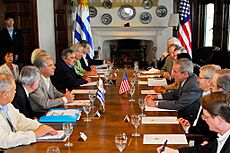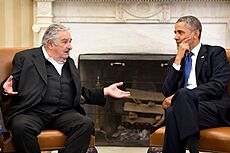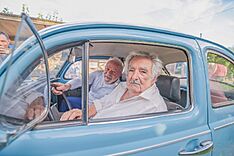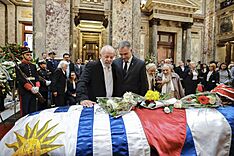José Mujica facts for kids
Quick facts for kids
José Mujica
|
|||||||||||||||||||||||||||||||||||||||||||||||
|---|---|---|---|---|---|---|---|---|---|---|---|---|---|---|---|---|---|---|---|---|---|---|---|---|---|---|---|---|---|---|---|---|---|---|---|---|---|---|---|---|---|---|---|---|---|---|---|
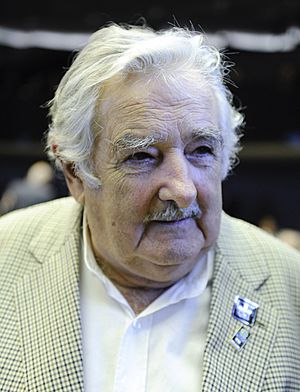
Mujica in 2015
|
|||||||||||||||||||||||||||||||||||||||||||||||
| 40th President of Uruguay | |||||||||||||||||||||||||||||||||||||||||||||||
| In office 1 March 2010 – 1 March 2015 |
|||||||||||||||||||||||||||||||||||||||||||||||
| Vice President | Danilo Astori | ||||||||||||||||||||||||||||||||||||||||||||||
| Preceded by | Tabaré Vázquez | ||||||||||||||||||||||||||||||||||||||||||||||
| Succeeded by | Tabaré Vázquez | ||||||||||||||||||||||||||||||||||||||||||||||
|
|||||||||||||||||||||||||||||||||||||||||||||||
| Personal details | |||||||||||||||||||||||||||||||||||||||||||||||
| Born |
José Alberto Mujica Cordano
20 May 1935 Montevideo, Uruguay |
||||||||||||||||||||||||||||||||||||||||||||||
| Died | 13 May 2025 (aged 89) Montevideo, Uruguay |
||||||||||||||||||||||||||||||||||||||||||||||
| Resting place | Mujica farmhouse, Rincón del Cerro, Montevideo | ||||||||||||||||||||||||||||||||||||||||||||||
| Political party | MPP (from 1989) | ||||||||||||||||||||||||||||||||||||||||||||||
| Other political affiliations |
|
||||||||||||||||||||||||||||||||||||||||||||||
| Spouse | |||||||||||||||||||||||||||||||||||||||||||||||
| Occupation |
|
||||||||||||||||||||||||||||||||||||||||||||||
| Signature | |||||||||||||||||||||||||||||||||||||||||||||||
José Alberto "Pepe" Mujica Cordano (born May 20, 1935 – died May 13, 2025) was a politician and farmer from Uruguay. He served as the 40th president of Uruguay from 2010 to 2015. Before becoming president, he was part of a group called the Tupamaros. He was imprisoned for 13 years during a time when the military ruled Uruguay.
Mujica was known for his very simple lifestyle. People often called him "the world's poorest president." He gave away about 90 percent of his monthly salary to charities. These charities helped people with low incomes and small businesses. He believed that focusing too much on owning things does not make people happy.
During his time as president, Mujica's government made several important changes. These included new laws about allowing same-sex marriage. His government also helped strengthen trade unions and increased the minimum wage for workers.
Contents
Early Life and Education
José Alberto Mujica Cordano was born in Montevideo, Uruguay, on May 20, 1935. His father, Demetrio Mujica Terra, was a farmer. His mother, Lucy Cordano Giorello, came from Italian immigrant parents.
José's father passed away when José was only five years old. His mother's family had a farm where they grew grapes. José's maternal uncle, Ángel Cordano, was involved in politics and influenced young José.
Mujica went to school but did not finish college. When he was a teenager, from ages 13 to 17, he was a cyclist for different clubs.
In 1956, Mujica met a politician named Enrique Erro. Mujica then became very active in the National Party. Later, in 1962, Mujica and Erro left the National Party to start a new left-wing party called Unión Popular.
Joining the Tupamaros
In the mid-1960s, Mujica joined a new group called the MLN-Tupamaros. This was a left-wing political group that used armed actions. He took part in a brief takeover of a town called Pando in 1969.
Mujica was captured by the authorities several times. He was one of many Tupamaros who escaped from Punta Carretas Prison in 1971 by digging a tunnel. He was caught again but escaped once more in 1972. He was finally caught for the last time in 1972.
After a military takeover in 1973, Mujica and eight other Tupamaros were held in very difficult conditions. He spent a total of 13 years in prison. During this time, he faced many health challenges.
In 1985, Uruguay became a democracy again. Mujica was set free under a law that pardoned political crimes. After his release, Mujica and many other Tupamaros joined other left-wing groups to form the Movement of Popular Participation (MPP). This party became part of a larger group called the Broad Front.
Early Political Career
In 1994, Mujica was elected as a deputy. In 1999, he became a senator. Because of his friendly personality, the MPP became very popular. By 2004, it was the largest group within the Broad Front.
In the 2004 elections, Mujica was re-elected to the Senate. The Broad Front won the presidential election with Tabaré Vázquez as their candidate. On March 1, 2005, President Vázquez chose Mujica to be the Minister of Livestock, Agriculture and Fisheries. Mujica had a background in farming, so this role suited him. He left his senator position to take on this new role. He served as minister until 2008, when he returned to the Senate.
Presidential Campaign
In 2009, Mujica decided to run for president. He won the primary elections for the Broad Front. Danilo Astori agreed to be his running mate. Their campaign promised to continue the good policies of the previous government.
In October 2009, Mujica won the most votes in the general election, but not enough to win outright. So, a second election was held on November 29. On November 30, Mujica won with over 52% of the votes. In his first speech as president-elect, he called for unity and said there were "no winners or losers."
Presidency (2010–2015)
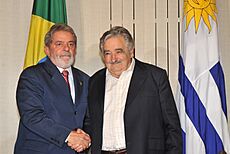
As president, Mujica formed a cabinet with politicians from different parts of the Broad Front. He gave the economic roles to people who worked with his vice president, Danilo Astori.
Mujica also signed laws that allowed same-sex marriage.
In September 2013, Mujica gave an important speech at the United Nations General Assembly. He talked about humanity and how the world is connected. He asked countries to work together to protect the planet for future generations. He also spoke about the power of financial systems and how economic problems affect everyday people. He encouraged people to live simpler lives, focusing on relationships, love, friendship, and family, instead of being controlled by money and markets.
During his presidency, Uruguay saw many positive changes. The amount of money spent on social programs increased. The unemployment rate stayed low, and the number of people living in poverty went down. The minimum wage was also raised. His government also supported strengthening trade unions, which are groups that protect workers' rights. Uruguay became known as a country that highly respected workers' rights.
The Uruguayan Constitution does not allow presidents to be re-elected right away. So, Mujica could not run for president again in the 2014 election. On March 1, 2015, his time as president ended. Tabaré Vázquez became president again. Mujica left office with a strong economy and a stable country.
After the Presidency (2015–2025)
After his presidency, Mujica continued to serve as a senator from 2015 until 2020.
On October 20, 2020, Mujica resigned from the Senate. He announced he was retiring from politics because of his age and the COVID-19 pandemic. He was 85 years old at the time.
Political Views
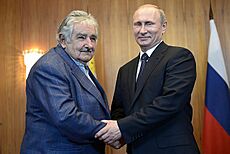
Mujica's political ideas changed over the years. He became more practical in his approach. He wanted the political left to be more flexible. His way of speaking and his informal style made him very popular, especially among people in rural areas and those with lower incomes. People often described him as someone who "speaks the language of the people."
He was friendly with Venezuelan President Hugo Chávez. Mujica also hoped to improve agreements between the European Union and Mercosur, a trade group that Uruguay is part of. He worked to end a long-standing dispute between Argentina and Uruguay over a river. His good relationship with Argentinian President Cristina Fernández de Kirchner helped solve this issue.
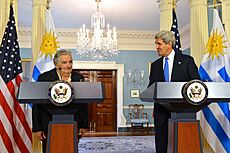
In a talk in Mexico in 2014, Mujica spoke about many important topics. He talked about poverty and unfairness in society. He said that Latin America is a very unfair continent, even though it is rich. He also spoke about the importance of Latin American countries working together. He encouraged young people to never give up, saying, "The only losers are the ones who stop fighting."
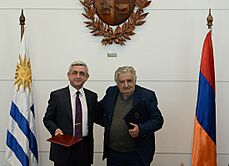
After leaving the presidency, Mujica shared his thoughts on other leaders. He criticized some left-wing governments for being too controlling. He also spoke about the importance of leaders letting go of power after their terms end. He called the election of Javier Milei as president of Argentina "madness." He also criticized Vladimir Putin and believed the conflict in Ukraine could have been avoided.
Personal Life
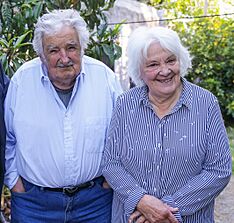
In 2005, Mujica married Lucía Topolansky. She was also a former member of the Tupamaros. They did not have children. They lived on a farm outside Montevideo, where they grew flowers to sell. They had several pets, including a three-legged dog named Manuela. Lucía Topolansky even served as acting president for a short time in 2010 when her husband and the vice president were away.
Mujica was famous around the world for his simple way of life. He chose not to live in the presidential palace or use its staff. He drove an old 1987 Volkswagen Beetle and rode his 60-year-old bicycle. In 2010, his car was worth only US$1,800, and it was almost all of his declared wealth. In 2014, he was offered US$1,000,000 for his car. He said if he received the money, he would donate it to help homeless people.
Mujica was a big fan of association football and supported his local club, Club Atlético Cerro.
Illness and Death
In April 2024, Mujica announced that he had been diagnosed with esophageal cancer. He said that his condition was made more difficult by another health issue he already had. Even with his illness, Mujica supported the presidential campaign of Yamandú Orsi in the 2024 election. He later called Orsi's victory a "farewell gift."
In January 2025, Mujica shared that the cancer had spread to his liver and that he was dying. He decided not to continue with further medical treatments. On May 12, his wife, Lucía Topolansky, said that Mujica was "terminally ill" and was receiving hospice care.
José Mujica passed away the next day, on May 13, 2025, at his farmhouse in Montevideo. He died just a week before his 90th birthday. The Uruguayan government declared three days of national mourning. His state funeral took place from May 14 to 15 in Montevideo. Many important people, including presidents, attended. It is estimated that 100,000 people came to his funeral. Mujica's remains were cremated on May 16 and later buried at his farmhouse.
Honors and Awards
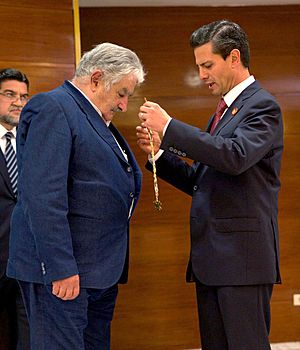
 Argentina:
Argentina:
 Brazil:
Brazil:
 Grand Collar of the Order of the Southern Cross (5 December 2024)
Grand Collar of the Order of the Southern Cross (5 December 2024)
 Colombia:
Colombia:
 Ecuador:
Ecuador:
 Honduras:
Honduras:
 Mexico:
Mexico:
 Collar of the Order of the Aztec Eagle (28 January 2014)
Collar of the Order of the Aztec Eagle (28 January 2014)
 Panama:
Panama:
 Paraguay:
Paraguay:
 Peru:
Peru:
 Republika Srpska:
Republika Srpska:
See also
 In Spanish: José Mujica para niños
In Spanish: José Mujica para niños
- List of people who have received a state funeral
- List of presidents of Uruguay
 | Laphonza Butler |
 | Daisy Bates |
 | Elizabeth Piper Ensley |


